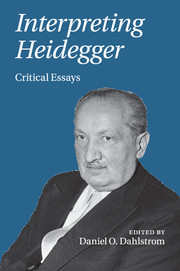Book contents
- Frontmatter
- Contents
- List of contributors
- Acknowledgments
- Method of citation and bibliography of Heidegger's works
- Introduction
- I Interpreting Heidegger's Philosophy
- 1 Heidegger's hermeneutics: towards a new practice of understanding
- 2 Facticity and Ereignis
- 3 The null basis-being of a nullity, or between two nothings: Heidegger's uncanniness
- 4 Heidegger's concept of freedom, 1927–1930
- 5 Ontotheology
- II INTERPRETING HEIDEGGER'S INTERPRETATIONS
- III INTERPRETING HEIDEGGER'S CRITICS
- Index
- References
3 - The null basis-being of a nullity, or between two nothings: Heidegger's uncanniness
Published online by Cambridge University Press: 11 April 2011
- Frontmatter
- Contents
- List of contributors
- Acknowledgments
- Method of citation and bibliography of Heidegger's works
- Introduction
- I Interpreting Heidegger's Philosophy
- 1 Heidegger's hermeneutics: towards a new practice of understanding
- 2 Facticity and Ereignis
- 3 The null basis-being of a nullity, or between two nothings: Heidegger's uncanniness
- 4 Heidegger's concept of freedom, 1927–1930
- 5 Ontotheology
- II INTERPRETING HEIDEGGER'S INTERPRETATIONS
- III INTERPRETING HEIDEGGER'S CRITICS
- Index
- References
Summary
For Bill Richardson
At times, reading a classical philosophical text is like watching an ice-flow break up during global warming. The compacted cold assurance of a coherent system begins to become liquid and great conceptual pieces break off before your eyes and begin to float free on the sea. To be a reader is to try and either keep one's footing as the ice breaks up, or to fall in the icy water and drown.
This is true of every page of Heidegger's Sein und Zeit (hereafter Being and Time). But it is nowhere truer than in the discussion of conscience in Division II, which, to my mind, is the most interesting moment in Being and Time. I want to try and show where the ice-flow of fundamental ontology begins to crack, for it is there that the question of the uncanny and the stranger will begin to make themselves heard. At stake will be bringing the human being face to face with its uncanniness, with the utter strangeness of being human: we are the null basis-being of a nullity, a double zero suspended between two nothings.
As everyone who has read Being and Time is aware, what Heidegger is seeking in Division II of Being and Time is an authentic potentiality for being a whole, which turns on the question of the self.
Information
- Type
- Chapter
- Information
- Interpreting HeideggerCritical Essays, pp. 69 - 78Publisher: Cambridge University PressPrint publication year: 2011
References
Accessibility standard: Unknown
Why this information is here
This section outlines the accessibility features of this content - including support for screen readers, full keyboard navigation and high-contrast display options. This may not be relevant for you.Accessibility Information
- 2
- Cited by
